Your Questions | About Pet Rats Answers
QUESTION: Do your rats pee on you? What can be done about this?
ABOUT PET RATS ANSWERS: Here are two types of situations in which your rats might urinate on you along with possible solutions:
SCENARIO #1:
Your rat is on your shoulder, on your lap or maybe even inside your shirt and he or she really does need to urinate.
SOLUTION:
First, learn the signs your rats display when they’re with you and they need to urinate. My rats get “antsy”. They move around a lot and even try frantically to get off of me. Until I finally realized they needed to urinate, I just thought my rats weren’t happy being with me!
Every rat is different, so pay close attention to how your rats act right before they’re about to urinate on you.
If you aren’t able to detect any signals, then every 20-30 minutes or so, place your rats onto paper towels that you keep close by for them to use as a “litter box”. When doing so, say aloud “Litter Box” or “Paper Towels” to help them understand what you want them to do.
Here’s an article on Litter Box Lessons for You & Your Pet Rat that explains this type of training in more detail.
Rats are smart. They can learn that it’s not okay to urinate on you. Once you identify your rats’ signals and show your rats the appropriate place for them to urinate, both you and your rats will become a lot more comfortable with one another.
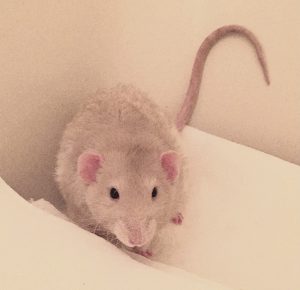
SCENARIO #2:
You’re sitting on the floor playing with your rats. One of your rats walks across your hand or arm and dribbles a few drops or even a small stream of urine onto your skin. Most often, but not always, it’s male rats who exhibit this type of marking behavior.
SOLUTION:
If it is a male rat who’s marking you with urine, neutering often solves this problem. If neutering isn’t an option, (such as when it’s a female,) training can help. I’d even suggest training before deciding to neuter a male rat (if marking is the only reason you’re thinking of neutering).
Similar to the solution for Scenario #1, place your rat on a paper towel or in a litter box the moment s/he begins to mark you with urine.
Even better, observe your rat’s PRE-marking behavior closely so you can place him or her on a paper towel or in a litter box before he dribbles any urine on you. By doing so, your rat will learn that urine belongs in a litter box or on paper towels and not on you.
Both of these solutions will help you and your pet rats better understand one another and to develop an even closer bond.
If you have any questions about your pet rats, feel free to respond below or to ask your question on the Contact Me page. I’m here for you and your rats!
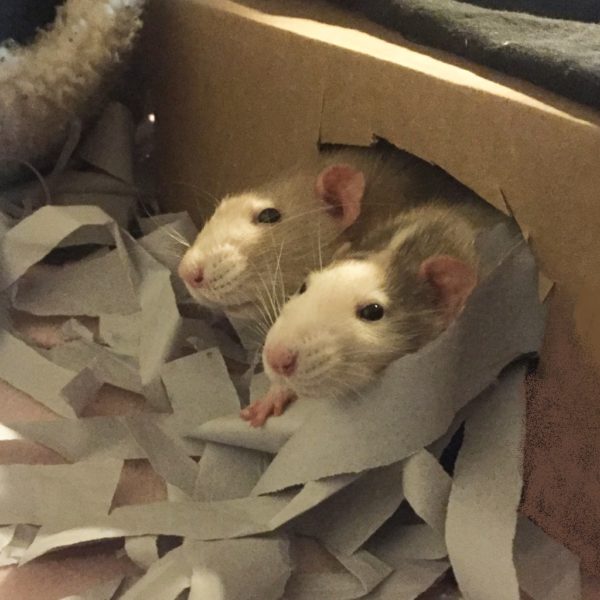
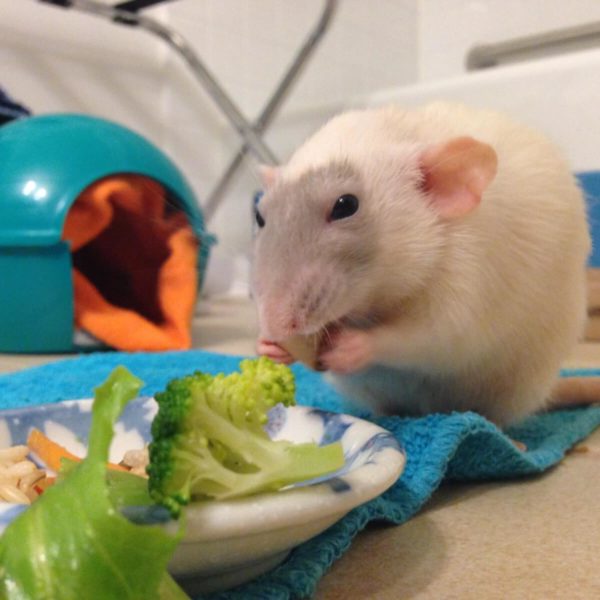
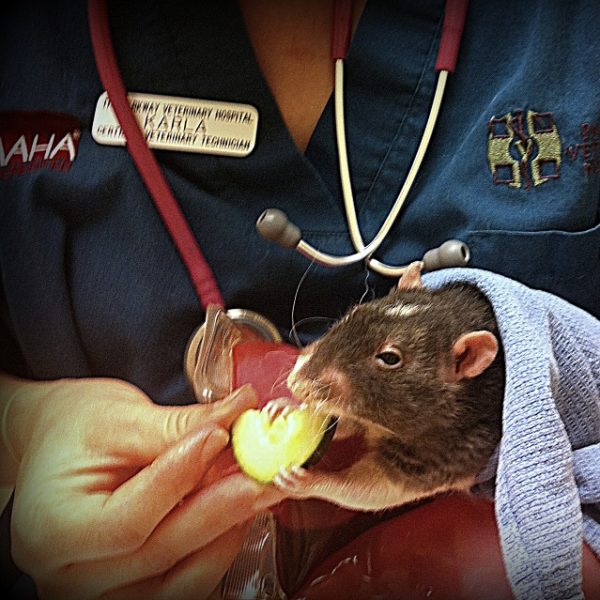
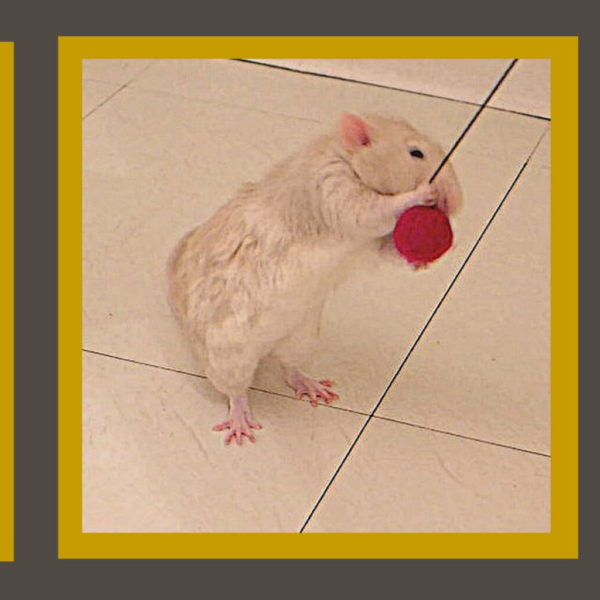



Hello,
im having problem with both my male rats (3,5 monts and fertile) i got when they were 8 weeks old. I started trying to potty train them from the beginning and currently they only use the 1 floor of the cage ( 3 floors in total) to defecate and they don’t defecate during outside cage time. However they pee everywhere in the cage, especially on their hanging mat and other furniture. I think they are too lazy to move when they have to pee and just pee where they sleep. I find it unsanitary however leave their toys in for a few more days since i don’t want to handwash every day. I clean the cage everyday and use paper towels. The dirty ones i put on the 1 floor so that place is the smelliest and they have their pee rock there but still can’t train them to not go anywhere else. Please help.
Hi Anita,
Thanks for asking your excellent question! I’ve written an entire post about this. The article is called Litter Box Literacy: The Finer Points of Teaching Pet Rats to Urinate in Litter Boxes. It includes ideas that I think will really be helpful for you. What I think will be most useful is what I wrote towards the end of the article about picking your rats up while they’re sleeping and placing them directly into a litter box. Most rats have to urinate as soon as they wake up, so wherever you put them down, they’ll have to pee there. If you have any further questions after reading this article, let me know. I’m happy to help anytime.
I want to comment on what you wrote about placing the dirty paper towels on the first floor of their cage. I’m not sure if when you say they’re dirty, do you mean they’ve been urinated on? If so, why don’t you just replace these? The odor of urine when left in their cage for very long is dangerous to their health. It can result in your rats developing respiratory disease. Maybe I misunderstood what you wrote, though?
Let me know if you have any other questions. That’s fantastic you’re teaching your rats where to urinate and defecate!
Best Wishes to You & Your Rats,
Jasmine | About Pet Rats
We found that once we trained a rat, all the babies raised with that rat picked up on the litter training and no more poo’d on us after the first set. We recently picked up “outside” rats and brought them into our mischief, and they took a long time to train and were the only ones that made accidents on the furniture.
So if you are looking for new rats. Consider getting from a hobby breeder who doesn’t breed for quantity and has had time to handle. Just having well trained parents makes a big difference in many rats.
My observation of 20+ years loving on rats.
Great points! Thank you for your comments and for sharing your experience with rats and litter training.
Best Wishes to You & Your Rats,
Jasmine | About Pet Rats
Males (unless neutered) do it more than females. My rats let me know when they need to pee or poop by getting as close to their cage as they can and looking toward it.
My neutered male NEVER pee marks anything. I suspect that spaying females would decrease that behavior too, however I never researched it.
Potty training does take awhile sometimes, especially if your rats are young. It took me…3-4 months or so to get the point across to my rats about potty training. Starting early is a good thing for them. Just be persistent about it.
Hi Kevin,
Thanks for sharing your experiences with training your rats where to urinate and defecate.
It’s always helpful to hear varying points of view. Reading what you wrote will give other rat owners both hope and a different perspective.
Thanks Again!
Jasmine | About Pet Rats